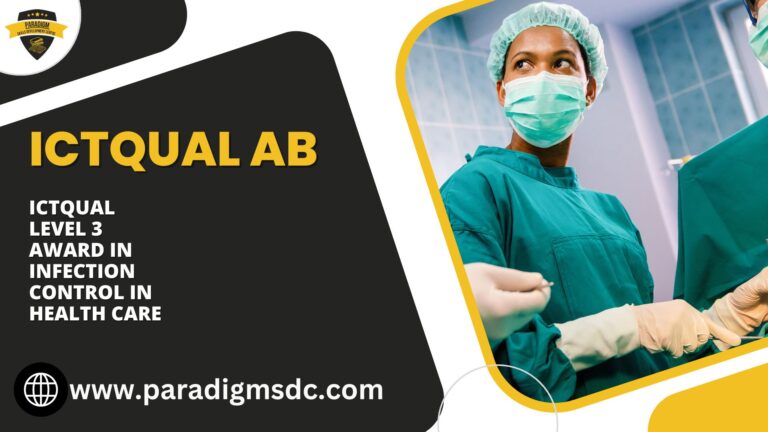Course Introduction
The ICTQual Level 3 Diploma in Process Safety Management is designed to provide a thorough understanding of managing safety within industrial processes. This diploma equips learners with the necessary knowledge and skills to ensure safe operational practices, mitigate risks, and comply with regulatory standards in process industries.
Course Overview
This diploma covers a range of critical topics essential for effective process safety management. It explores principles, methodologies, and best practices aimed at preventing incidents and enhancing safety across various industrial settings.
Course Study Units
- Introduction to Process Safety Management
- Hazard Identification and Risk Assessment
- Safety Management Systems
- Process Hazard Analysis
- Emergency Response Planning
- Regulatory Framework and Compliance
Learning Outcomes
By the end of this diploma, learners will:
Introduction to Process Safety Management
- Understanding of Process Safety: Gain a clear understanding of the concept of process safety management and its significance in industrial operations.
- Knowledge of Historical Incidents: Learn from historical incidents and understand the lessons learned to prevent similar occurrences in the future.
- Familiarity with Regulatory Frameworks: Acquire knowledge of the regulatory frameworks and standards governing process safety to ensure compliance within organizations.
Hazard Identification and Risk Assessment
- Hazard Identification Skills: Develop the ability to identify potential hazards associated with industrial processes, including chemical, mechanical, and environmental hazards.
- Risk Assessment Proficiency: Acquire skills in conducting risk assessments using various methodologies such as HAZID, HAZOP, and FMEA to prioritize risks effectively.
- Implementation of Risk Controls: Learn how to implement controls and safeguards to mitigate identified risks and prevent incidents from occurring.
Safety Management Systems
- Design and Implementation of SMS: Gain the expertise to design and implement robust safety management systems tailored to the specific needs and complexities of industrial processes.
- Promotion of Safety Culture: Understand the importance of fostering a strong safety culture within organizations and learn strategies for promoting safety leadership and employee engagement.
- Continuous Improvement: Learn how to establish processes for continuous improvement of safety management systems through audits, evaluations, and feedback mechanisms.
Process Hazard Analysis
- Proficiency in PHA Techniques: Develop proficiency in various process hazard analysis (PHA) techniques such as HAZOP, What-If analysis, and Layers of Protection Analysis (LOPA) to identify and mitigate potential hazards.
- Human Factors Awareness: Gain an understanding of the role of human factors in process safety and learn how to integrate human factors considerations into hazard analysis processes.
- Application of PHA Results: Learn how to effectively apply the results of process hazard analyses to improve safety practices and procedures within industrial processes.
Emergency Response Planning
- Development of Emergency Response Plans: Acquire the skills to develop comprehensive emergency response plans that outline procedures for responding to incidents effectively and minimizing their impact.
- Incident Command Systems (ICS): Understand the principles of incident command systems (ICS) and learn how to establish effective command structures during emergencies.
- Communication and Coordination: Learn how to facilitate effective communication and coordination among stakeholders during emergency response efforts to ensure a timely and organized response.
Regulatory Framework and Compliance
- Understanding of Regulatory Requirements: Gain a thorough understanding of the legal and regulatory requirements related to process safety, including relevant OSHA regulations and process safety management (PSM) standards.
- Compliance Management: Learn strategies for ensuring compliance with regulatory requirements and maintaining up-to-date documentation and records to demonstrate compliance.
- Integration of Regulatory Requirements: Understand how to integrate regulatory requirements into safety management systems and operational practices to ensure a comprehensive approach to compliance.
Course Benefits
- Enhanced Safety Awareness: Graduates will have a heightened awareness of process safety issues and be capable of implementing proactive safety measures.
- Career Advancement: This diploma equips professionals with specialized skills highly sought after in industries such as oil and gas, chemical manufacturing, pharmaceuticals, and more.
- Compliance and Risk Management: Organizations benefit from employees trained in managing process safety, ensuring compliance with legal requirements and minimizing operational risks.
Who Is This Course For?
The ICTQual Level 3 Diploma in Process Safety Management is ideal for:
- Process engineers
- Safety managers
- Operations supervisors
- Health and safety professionals
- Regulatory compliance officers
Future Progression
Upon completion, learners can pursue advanced qualifications or certifications in specific areas of process safety, such as:
- Advanced risk management certifications
- Leadership in safety management courses
- Industry-specific process safety training programs
Conclusion
The ICTQual Level 3 Diploma in Process Safety Management offers a comprehensive pathway for professionals aiming to enhance safety practices within process industries. With a focus on practical skills and theoretical knowledge, graduates are well-prepared to tackle the complex challenges of process safety management effectively. This diploma not only ensures compliance with industry standards but also fosters a culture of safety and continuous improvement within organizations.







